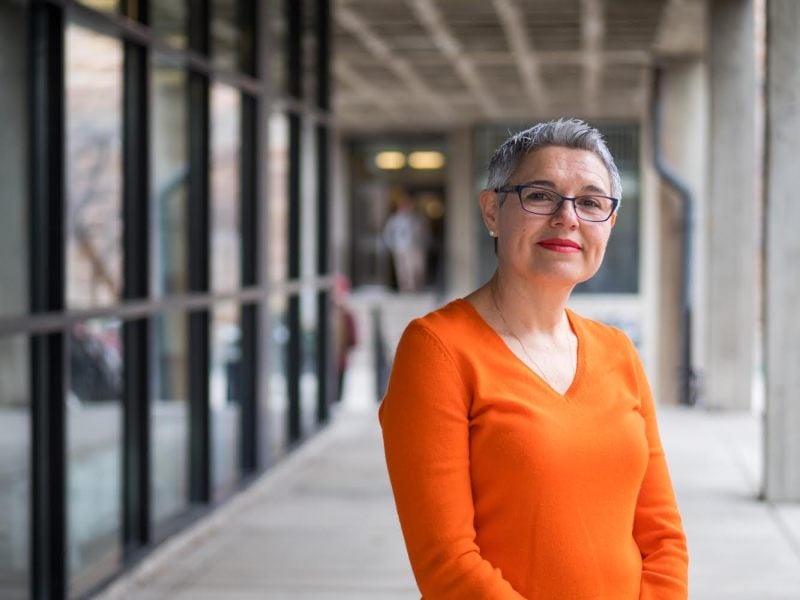Black, Latinx, and Indigenous people in the US are disproportionately impacted by the COVID-19 pandemic, with higher mortality rates, and more economic fallout and educational setbacks for our children. In Colorado, where I live, a higher percentage of the Latinx population has died from COVID-19 than any other group, according to the CDC.
Despite these realities, the voices and expertise of scholars from these communities have been missing in the search for solutions and public discourse. Ignoring the voices of Black, Latinx and Indigenous experts is not new in higher education and science.
I am a first-generation Latinx scholar in engineering and public health, trained at the very best institutions in this country, including Stanford. I have dedicated my scientific career to working with low-income communities. Though I do not look like most scientific experts you see on TV, I had all the right training and experiences to see this disaster coming.
As an aerosol scientist and indoor air quality expert, I called for the protection of Black, Indigenous and People of Color (BIPOC) and other vulnerable populations in this pandemic and spoke early about the role of aerosols in the transmission of the virus and the potentially devastating effects on these communities months before it was seriously considered by people in powerful positions. I provided guidance to the Latinx community in Spanish about protecting themselves from transmission. BIPOC scholars at the University of North Carolina also argued that campus responses could have been improved by including BIPOC voices; others trained minority students to use big data to better understand COVID-19 disparities.
Studying indoor air quality and related health outcomes in underserved communities, including the Mohawk and Navajo Nations, as well as Latinx and Asian immigrants, gave me early appreciation for the danger COVID-19 posed to these communities. My research determined that emissions from wood and coal burned inside Navajo homes increased the activation of antioxidant defenses and inflammation in cell models. This is important because they can lead to inflammatory responses in the respiratory, immune, cardiovascular and neural systems, which can render people more susceptible to COVID-19.
My study of low-income Latinx in Boulder found that housing quality was low and overcrowding was high. For participants with significant exposure to particulate matter (aerosols), their workplace appeared to be the primary source. Many of these people were deemed “essential” workers in the pandemic. Therefore, their essential work increased their likely exposure to the coronavirus, and their housing conditions promoted indoor transmission. These are the elements for a perfect storm.
Unfortunately, COVID-19 has been raging within another, larger and longer-lived pandemic: systemic racism in higher education and science.
Research in BIPOC communities is not well-funded on any topic, including indoor air quality. I am one of a very small number of Black, Latinx, and Indigenous scholars in aerosol science, and in my research on indoor air quality in disadvantaged communities have faced systemic racism, gender harassment and lack of funding. During the pandemic, I focused on advising those working directly with BIPOC communities, like my local government and Last Mile, a non-profit based in NYC through its COVID Straight Talk initiative. They brought together scientists and communities to raise awareness about COVID-19 being airborne, encourage harm reduction measures and support workplace safety legislation.
Lack of support for fields like indoor air quality, especially in underserved communities and by Black, Latinx and Indigenous researchers, has contributed to the inequities in this pandemic. President Biden spoke about being compassionate and putting oneself in someone else’s shoes. Similarly, my research responds to the call by Pope Francis to “listen to the cry of the earth and the cry of the poor”. Initiatives that elevate the voices of Black, Latinx and Indigenous scholars cannot continue to be disregarded. There are legitimate experts within our communities, with the desire to help, and we must not be ignored, an afterthought, or actively excluded.
The needs of frontline workers in this pandemic are still not properly addressed, especially within BIPOC communities. The Biden administration must promote indoor air quality policies and enforceable standards that protect these groups, like the NYS Heroes Act. We need to monitor, measure and actively clear the air in workplaces and do it affordably. To save lives and end the inequities uncovered by COVID, we need to listen to Black, Latinx, and Indigenous scholars who have spent their careers studying these communities. Most importantly, our people need to see us and hear our advice and our leaders need our help rebuilding trust within our communities.
— Dr. Lupita Montoya, MS ’91, PhD ‘99
Dr. Lupita Montoya will give a talk to Stanford University’s Alumni on May 18th to address Environmental Justice. She is a first-generation Latinx scholar from the LA area who conducts multidisciplinary research that addresses environmental and health impacts of indoor air pollution, especially in low-income communities in the US and abroad.
The Daily is committed to publishing a diversity of op-eds and letters to the editor. We’d love to hear your thoughts. Email letters to the editor to eic ‘at’ stanforddaily.com and op-ed submissions to opinions ‘at’ stanforddaily.com.
